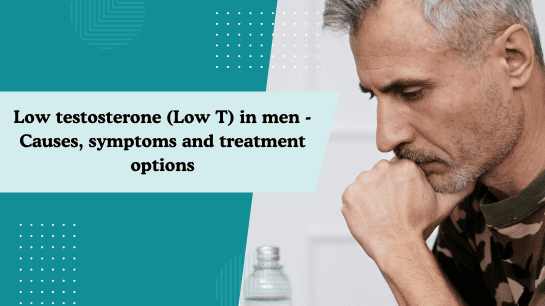Myths and facts about Erectile Dysfunction
Erectile dysfunction (ED), the constant inability to achieve or maintain an erection firm enough for pleasing sexual intercourse, is a common condition affecting men of all ages.
Despite its prevalence, ED is often shrouded in misinformation and misconceptions, leading to unnecessary anxiety, shame, and delayed help-seeking. We believe in providing accurate information and compassionate care at Dr Muthana Alrawi’s clinic.
This blog post aims to eliminate some common myths surrounding erectile dysfunction and shed light on the facts.
Myths and Facts about Erectile Dysfunction
Fact: While the prevalence of ED does increase with age, it is not solely a condition of older men. Younger men can also undergo ED due to various physical and psychological factors.
Studies have shown that a significant percentage of men under 40 report experiencing erectile difficulties. Attributing ED solely to aging can delay diagnosis and treatment for younger individuals who may be experiencing treatable underlying conditions.
Fact: While ED can sometimes be a symptom of a hidden medical condition like heart disease, high blood pressure, diabetes, or hormonal imbalances, it is not always the case.
Psychological reasons such as stress, anxiety, depression, and relationship troubles also play major roles in the occurrence of ED, particularly in young men.
Fact: While psychological factors play a major role in many cases of ED, it’s inaccurate to dismiss it as purely psychological.
ED often results from a complex interplay between physical and psychological factors. For instance, a minor physical issue might trigger anxiety about sexual performance, leading to a cycle of psychological ED. A comprehensive evaluation is necessary to identify all contributing factors.
Fact: Erectile dysfunction is a problem with achieving or maintaining an erection, not necessarily with sexual desire or libido.
A man with ED may still experience normal sexual desire and arousal but struggle with the physical mechanics of an erection. Low libido is a separate issue that can sometimes coexist with ED but has different underlying causes and treatments.
Fact: This harmful myth prevents many men from seeking help. Erectile dysfunction is highly treatable.
Numerous efficient treatment options are available, from lifestyle modifications and oral medications to vacuum devices, injections, and surgical implants.
The key is to seek professional help to identify the cause and explore the most suitable treatment approach for your needs.
Fact: Erectile dysfunction can significantly impact a man’s partner and their relationship. It can contribute to frustration, inadequacy, and decreased intimacy for both individuals.
Open communication and shared understanding are crucial in navigating this challenge as a couple.
Seeking treatment for ED can improve not only a man’s sexual function but also the overall quality of the relationship.
Fact: While extreme dehydration can lead to various bodily dysfunctions, including potentially affecting blood flow, it is unlikely to be a direct, long-term cause of chronic erectile dysfunction in otherwise healthy individuals.
Similarly, while prolonged exposure to very hot water might temporarily affect sperm production (which is a separate issue from erection), it is not a direct cause of ED. However, maintaining adequate hydration is crucial for overall health, including healthy blood circulation, essential for erectile function. Very hot water baths are unlikely to cause lasting ED.
Fact: Chronic and severe sleep deprivation can negatively impact overall health, including hormonal balance (such as testosterone levels) and mood, which can indirectly contribute to erectile difficulties.
However, occasional sleepless nights are unlikely to be a direct cause of persistent erectile dysfunction in otherwise healthy individuals. Maintaining a regular and sufficient sleep schedule is essential for overall well-being and can support healthy sexual function.
Fact: In many cases, erectile dysfunction is indeed treatable, and sometimes the underlying causes can be addressed to the point where the issue resolved.
For ED caused by reversible factors like lifestyle choices, stress, anxiety, or temporary medical conditions, addressing these factors can give rise to a significant improvement or even a complete resolution of the problem.
Even when the underlying cause is chronic, such as diabetes or heart disease, effective management of these conditions, along with specific ED treatments, can significantly improve erectile function.
Erectile Dysfunction (ED) Symptoms
Erectile dysfunction symptoms include:
- Difficulty achieving an erection
- Difficulty maintaining an erection
- Reduced sexual desire
- Premature ejaculation
It is essential to note that occasional issues with erections are typical, but if the problem persists over time, it could signal erectile dysfunction.
Is Erectile dysfunction curable?
The “curability” of erectile dysfunction depends on the underlying cause. ED caused by psychological factors, lifestyle choices, or temporary medical conditions can often be resolved with appropriate therapy, lifestyle changes, or treatment of the underlying issue.
For ED-related chronic conditions, management of those conditions and the use of ED-specific treatments can significantly improve erectile function and quality of life, even if a complete “cure” isn’t always possible.
Can lack of sleep cause Erectile Dysfunction?
Insufficient sleep can disrupt hormone levels, increase stress, and lead to fatigue, negatively impacting libido and erectile function.
While occasional lack of sleep might lead to temporary difficulties, chronic sleep deprivation can be a contributing factor to ED in some men. Addressing sleep issues is essential to overall health and can positively influence sexual health.
Can dehydration cause Erectile Dysfunction?
Severe dehydration can potentially impact blood volume and circulation, which are essential for achieving an erection. However, mild or moderate dehydration is unlikely to cause persistent ED directly.
Addressing dehydration by drinking enough fluids is essential for overall health and may indirectly support healthy sexual function.
Can hot water cause Erectile Dysfunction?
Prolonged exposure to very high temperatures, such as in saunas or hot baths, can temporarily affect sperm production and motility. However, this is distinct from erectile function. There is no direct evidence to suggest that hot water exposure causes long-term erectile dysfunction.
How does Erectile Dysfunction (ED) affect a woman?
While ED is a man’s condition, it can have emotional and psychological repercussions for his partner. A woman might experience feelings of:
Rejection or unattractiveness: She may mistakenly believe that her partner’s inability to achieve an erection is a reflection of his lack of desire for her.
Frustration and dissatisfaction: Reduced sexual intimacy can lead to dissatisfaction and strain on the relationship.
Guilt or blame: She might wonder if she has done something to cause the problem.
Anxiety and worry: She may worry about her partner’s health or the future of their sexual relationship.
Open and honest communication within partners is vital to address these feelings and work together to find solutions.

Seeking help is the first step
If you are experiencing erectile dysfunction, remember that you are not alone, and help is available. Don’t let myths and misconceptions prevent you from seeking the care you deserve.
Schedule a consultation with Dr Muthana Alrawi to receive an accurate diagnosis, discuss your concerns openly, and explore the most impactful treatment options tailored to your needs.
Taking that first step can extensively improve your sexual health and overall well-being.




